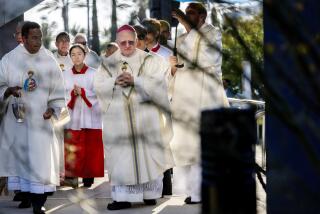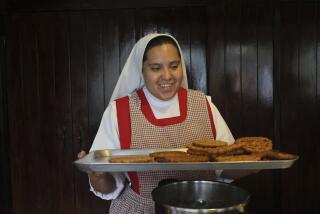Nun Adds the Practice of Law to Religion : She Finds Satisfaction in Supplying Low-Cost Legal Aid to Indigent
- Share via
A picture of the Virgin Mary hangs at the Community Law Center in Santa Ana, along with the Kansas State Bar diploma of Sister Annette Debs. A California State Bar diploma, she said, is in safe keeping.
Debs, 46, is one of the members of the Catholic religious and clergy throughout the country, now numbering about 200, who also are practicing attorneys.
Debs and her law partner, Lucy Fitzpatrick, who is not a nun, mostly represent impoverished Latinos who often do not qualify for federally subsidized legal aid or the state’s trust fund. She charges small fees for indigent people because, she said, the firm is not one which gives its clients a free ride.
The law center charges clients on a sliding scale of about $30 an hour, depending on a person’s individual income and family size. In comparison, lawyers throughout the county charge clients from $150 to $250 per hour.
“I decided that I wanted to be a more effective instrument to work for the rights of the poor,” said Debs, who also speaks fluent Spanish. “People were being abused by the system, and these people weren’t knowledgeable about the system. Legal services to the poor weren’t being served,”
Since the office at 317 E. Santa Ana Blvd. opened in 1981, the center has been aided financially the last four years by the Sisters of St. Joseph in Los Angeles, Debs’ order. This year the firm will receive about $16,000 in aid from her order.
Still, Debs said, “Financially, we barely make it.”
A portion of the small amount of money that Debs makes from her practice is given back to her religious community, as is required by nuns who work in the commu nity. The other part is used to pay her law partner, other office personnel and bills. In turn, the Sisters of St. Joseph provide her with living expenses.
Debs’ law center is one of 18 small law firms that has applied for part of a $25,000 federal grant, and she is optimistic that the center will get it.
“If we get it (the grant), it will be important because it will get us secure money that we definitely will get paid for our work,” Debs said, adding that her clients--for whatever reason--sometimes are not able to pay their fees. A decision on which law firms would receive the grants will be made in about a week or two.
She handles a wide range of cases that include immigration, family disputes, disability and unemployment. However, many of her recent cases involve child support or child custody which too often, she said, have no winners.
“I don’t like it,” she sighed. “It is extremely emotionally wearing. But it seems that people are desperate for that kind of representation and can’t get it. But if I had my druthers I would do no family law.”
In one recent case, for instance, Debs claimed that her client and the client’s three children had not been given child support payments for about three months, and when the client’s former husband finally gave her a $500 check, she couldn’t cash it because she knew it would bounce.
“We gave him a continuance provided that he pay $500 that day we demanded payment. And he said, ‘This check is good, this check is good.’ What made me very upset was that I tried calling his lawyer all afternoon and I couldn’t reach him, and my client was out of money that she needed. And he might wind up in jail,” Debs said.
Worked With Priests
After graduating from Mount St. Mary’s, Debs started work with two other priests in an inner-city parish in South-Central Los Angeles and was in charge of providing social services for the poor. After a few years and a few differences as to how the program should be run, the experimental project disbanded because, she believed, the priests weren’t used to having a woman in charge of a project.
Was there a little sexism involved? “Yes, indeed,” she said. As a result, the nun was out of work when she read an ad in the National Catholic Reporter, a newspaper that covers news concerning the Catholic Church, for schooling nuns in law. “I thought this was absolutely radical,” she said.
She took the lessons in the field of law and a year later, in 1976, her religious community gave her the go-ahead to attend law school at Southwestern University in Los Angeles. Two years later she passed the State Bar exam.
Practiced in Kansas
She received a fellowship to practice law in Kansas serving the indigent. There she also took the Kansas Bar exam and also passed. In 1980, she returned to California because “this is my home,” she said. A year later she started the firm.
Her clients and others in the legal profession have strong praise for her work. “Thanks to God and to her I don’t feel lonely because I have someone I can talk to about my problems,” said Maria Lopez, 36, who has sought Debs’ counseling on a rent issue for most of the year. “I came to her because I heard I could afford her fees. She is a good lawyer. She treats me as a friend and I see her as a friend.”
Robert Cohen, executive director of the Legal Aid Society of Orange County, said, “We have nothing but the highest respect for her.”
More to Read
Sign up for Essential California
The most important California stories and recommendations in your inbox every morning.
You may occasionally receive promotional content from the Los Angeles Times.













